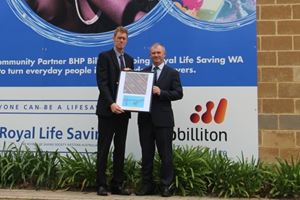More swimming pools needed in remote aboriginal communities
The poor health of remote Aboriginal communities has been well documented with children at a higher risk of severe skin, ear, eye and respiratory infections. These children are also at a significantly increased risk of drowning and poorer education outcomes as a result of lower school attendance rates.
A unique study conducted by the Royal Life Saving Society WA has found swimming pools in remote Aboriginal communities lead to greater community cohesion, improved health and well-being and higher school attendance.
Greg Tate, Royal Life Saving Society WA General Manager for Community Relations, believes the results from this project provide further evidence of the health benefits of remote pools.
While our findings are based purely on observations, community members consistently report that infections among children are reduced during the pool season.
Mr Tate says these results further justify enhanced government support of the project. "We are calling on the State Government to fund the building of more swimming pools in remote communities, so other community members can obtain the recognised health, social, educational and employment benefits delivered through the remote swimming pool program.”
Dr. Kim Hames, MLA and Program Patron says “Aboriginal swimming pools are one of the most successful interventions influencing health, social and education outcomes for these communities in our state.”
"These pools are a community hub and the focal point for social interactions and recreation for those in very remote locations. The community ownership they facilitate and their benefits for well-being make them valuable investments."
Mr Hames was today presented with a plaque to recognise his vital support of the program over the past 17 years.
The Remote Aboriginal Swimming Pool (RASP) program focuses on providing the remote communities of Burringurrah, Jigalong, Yandeyarra, Bidyadanga, Warmun and Fitzroy Crossing with recreational and educational swimming programs, to encourage safe aquatic participation. Funding is provided by WA’s State Government Housing Authority and BHP Billiton, while the pools are run and managed by the Royal Life Saving Society.
In order to gather feedback on the effectiveness of the RASP program, and to encourage the communities to identify areas for improvement, Royal Life Saving Society researchers engaged with participants in three of the six communities over a six month period. Interviews were conducted with adults, while students took photos of things they liked and didn’t like about the pools; captions written to describe these photos were then analysed.
Participants identified a range of encouraging aspects of the RASP program including cultural appropriateness, community participation, positive effects on health, swimming ability and well-being and the promotion of good behaviour among youth. Evidence suggested the pool encouraged younger students to attend school through the implementation of the ‘No School No Pool’ policy.
A full copy of the Research Report is available for download at the link below.
